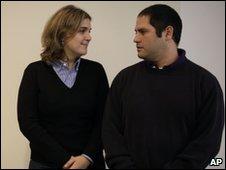Argentine media heirs submit to 'Dirty War' DNA tests
- Published

Marcela and Felipe say they have no wish to discover their birth families
Scientists in Argentina have begun DNA tests on the adopted heirs to a media empire to see who their natural parents are.
A judge ordered the tests to see if Marcela and Felipe Noble Herrera were taken from people killed during military rule in the 1970s and 80s.
Human rights groups say the children were then given up for adoption.
The siblings say their privacy is being violated and there is no evidence against their adoptive mother.
Marcela and Felipe surrendered clothes so that samples of their DNA could be taken after a court order last week.
The DNA will be compared to samples given by hundreds of families whose relatives were tortured and murdered during military rule from 1976 to 1983, a period known as Argentina's Dirty War.
It may take weeks for the results to be known.
Victim support groups first said in 2001 that they believed the biological mothers of Marcela and Felipe were among the hundreds of women who gave birth in clandestine torture centres and were then murdered.
The Grandmothers of the Plaza de Mayo group alleges that Ernestina Herrera de Noble, who owns the Clarin media conglomerate, illegally adopted them 34 years ago.
Marcela and Felipe say the demand for DNA tests is part of a politically motivated campaign against their adoptive mother, who has clashed with the government of President Cristina Fernandez de Kirchner.
Identity
They have said there is no evidence that they were born in jail and seized from their biological parents, and that they have no desire to know more about their birth families.
"Our identity is ours. It's a private thing and I don't think it's up to the state or the Grandmothers to come and tell us what is ours," Marcela said.
They say that if the tests show they are the offspring of murdered political prisoners, they do not want to become the physical evidence against their mother.
Ernestina Herrera de Noble's lawyer has said that the prosecution would still have to prove she knowingly adopted stolen children.
Under military rule, babies were often given to families considered loyal to the regime.
The Grandmothers have identified dozens of children of people who disappeared during this time.
But some adopted children have said they would rather not know their origins, especially if the information implicates their adoptive parents in illegal acts.